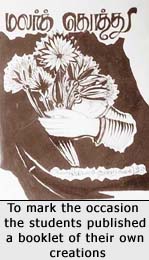 |
 14th June 1998 |
Front Page| |
 Malar Koththu from Sinhala students |
Contents
|
|
 |
Malar Koththu from Sinhala studentsBy Tharuka Dissanaike
As the head of the Linguistics Faculty of the Kelaniya University, the Ven. Kadurugamuve Nagitha Thero is a key figure behind the Tamil Day which will be staged by his students this Wednesday, June 17. What makes this Tamil Day special is that all performers will be Sinhala students, who are currently taking the Certificate Course in Tamil Language. The students will sing, dance, stage dramas and speeches- all in Tamil- in a first ever attempt of its kind in the University’s history. To mark the occasion, they will also publish a booklet, ‘Malar Koththu’, meaning, ‘a bouquet of flowers’. The cover and all the published material are creations of the certificate course students. Even the invitations for the Tamil Day have been designed and turned out by them. Ven. Nagitha said that he could take the credit for the idea of organising the Tamil Day. “I think it was when I attended a similar display of talent in French by students of the Modern Languages Department, that I thought to myself, why shouldn’t we do something in Tamil?”
The students, are most enthusiastic. For them, learning Tamil in a classroom atmosphere and with little opportunity to use the language in their day- to- day lives, it is wonderful to be presented with the chance to actually perform in Tamil. Says Ven. Nagitha, “This was one of the main aims of the Tamil Day. The students have an opportunity to use the language. Also they overcome any shyness they may feel in using a new language. Many may know good Tamil, but will be shy to use it in public for fear of wrong pronunciation. The Tamil Day strives to rid them of these taboos.” Nagitha Thera has another theory. Simply learning a language is not enough. It is important for students to be familiar with the socio- cultural background of the language. Students gain insight into the ways, manners, the religion and the social behaviour of the Tamil people, in the preparation for this Tamil Day. “When you understand the other side better, you learn to respect the other’s cultural identity. Just as much as we are Sinhalese and proud of it, we must learn to respect Tamil culture and their way of life.” And of course, such reasons are important in today’s context. But, as Nagitha Thero said, the Tamil Language course in the university has been in existence for 25 years, long before the war. “We did not begin teaching Tamil after the problems erupted. But now, we do see a tremendous interest among the Sinhala students to sign in for this course.” The Certificate Course in Tamil Language is a two year extra course for university students taking any kind of degree programme in the campus. According to Yogarajah, more than 1000 applicants register for the course at the beginning. But unfortunately timetable clashes and other priorities compel many students to drop out, though at least 50-100 students pass out from the course every year. The course begins by teaching spoken Tamil and how to pronounce words and then moves to writing, grammar and spelling etc. Around 300 students are taking part in this Wednesday’s Tamil Day, despite it being only a month away from the final examinations in campus. “If not for the exams a lot more students would have taken part,” said Samantha, who leads the organising committee for the Tamil Day. Samantha said that he took the Tamil course because he felt that it was necessary to know the language. “We have to know Tamil in order to communicate with people,” he said. “Now I try to strike up conversations with Tamil shop keepers and so on. It really surprises them- makes them happy.” Nagitha Thero laughs. “When I try to strike up a conversation in Tamil, they reply in Sinhala.” Ven. Nagitha researched the use of the Tamil language in the estate sector for his MA and PhD. He, together with Yogarajah has written books to help students learning Sinhala or Tamil. The Tamil Day will begin at the auspicious time of 2.30pm. The decor and refreshments for guests will be turned out in traditional Tamil style. Speeches will be made in both languages. Prof. Kumaraswamy Somasundaram, member of the Tamil Literary Panel will deliver a lecture on Tamil Culture. And then the students will take over, with their home- spun scripts and popular songs… in Tamil of course.
More Plus * Danger Dengue ahead * How to prevent Dengue
Front Page| News/Comment| Editorial/Opinion| Business| Sports | Mirror Magazine |
|
 |
Please send your comments and suggestions on this web site to |
|
 Ven.
Nagitha Thero did not request or want the publicity. But, he conceded,
the students deserved it. “I also hope that what we are trying to do will
be an example to others.”
Ven.
Nagitha Thero did not request or want the publicity. But, he conceded,
the students deserved it. “I also hope that what we are trying to do will
be an example to others.” His
idea was well received by the staff. Especially by Joseph Yogarajah, one
of the three Tamil lecturers in the faculty, who is greatly involved with
the Tamil Day presentations. Yogarajah studied Sinhala at Kelaniya two
decades ago. Today he teaches Tamil to Sinhala students.
His
idea was well received by the staff. Especially by Joseph Yogarajah, one
of the three Tamil lecturers in the faculty, who is greatly involved with
the Tamil Day presentations. Yogarajah studied Sinhala at Kelaniya two
decades ago. Today he teaches Tamil to Sinhala students.